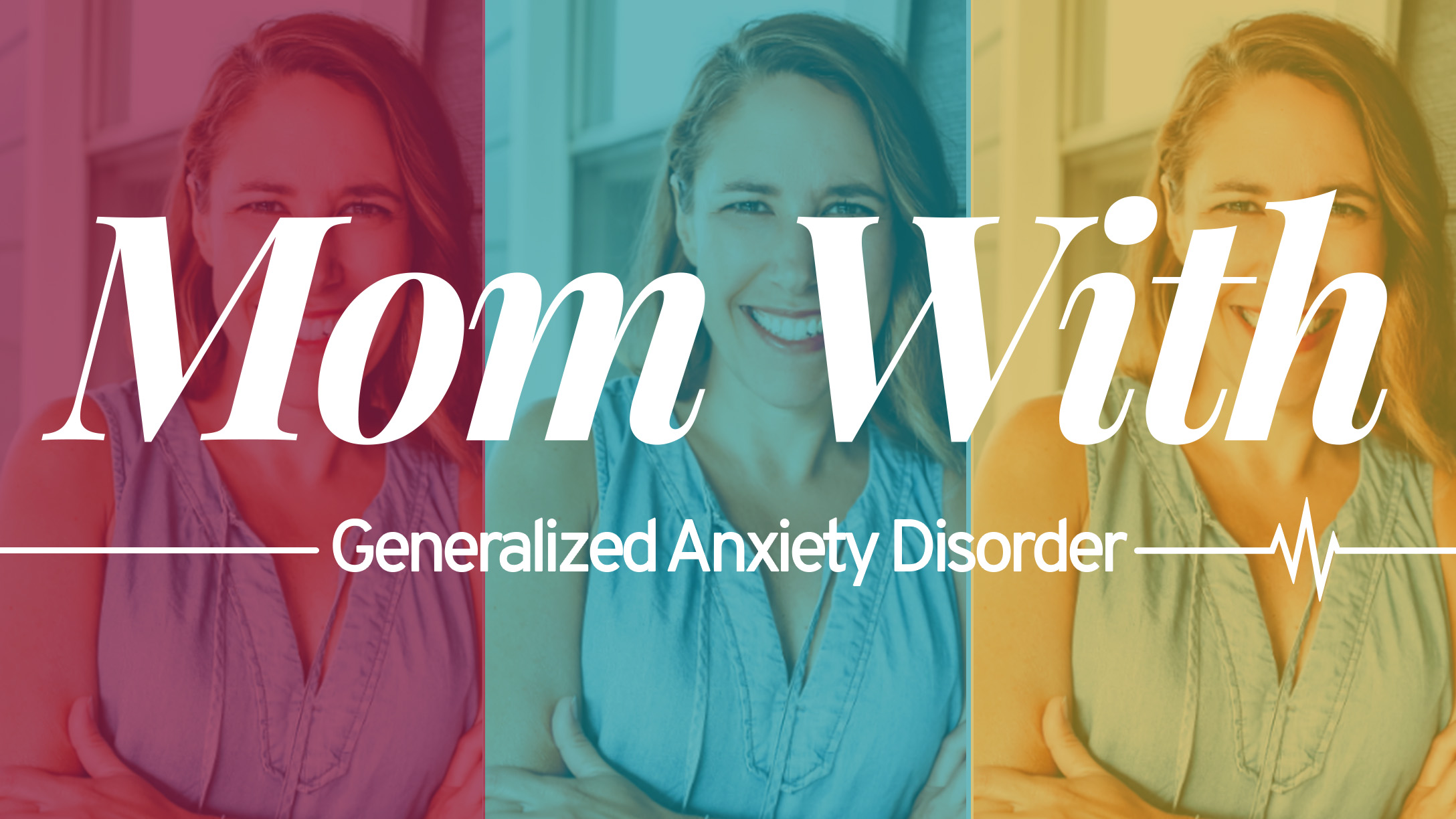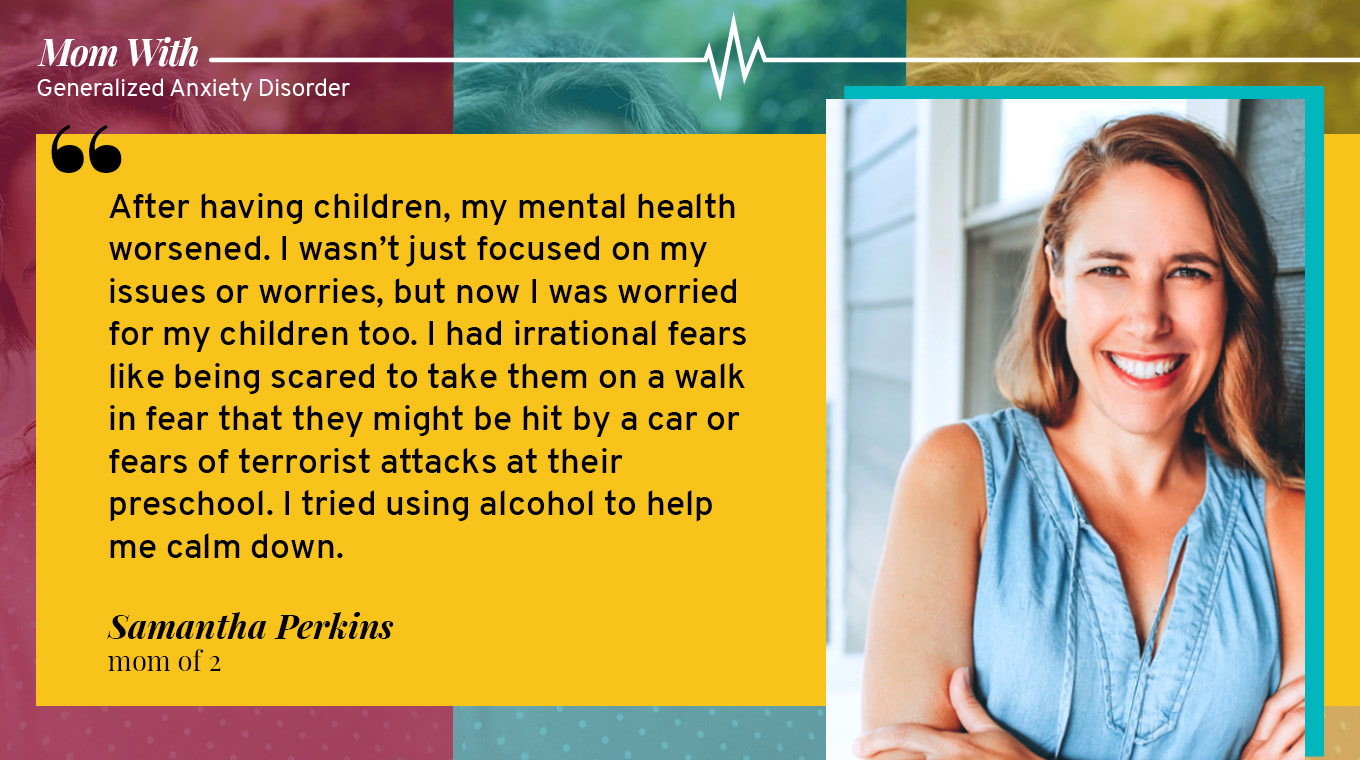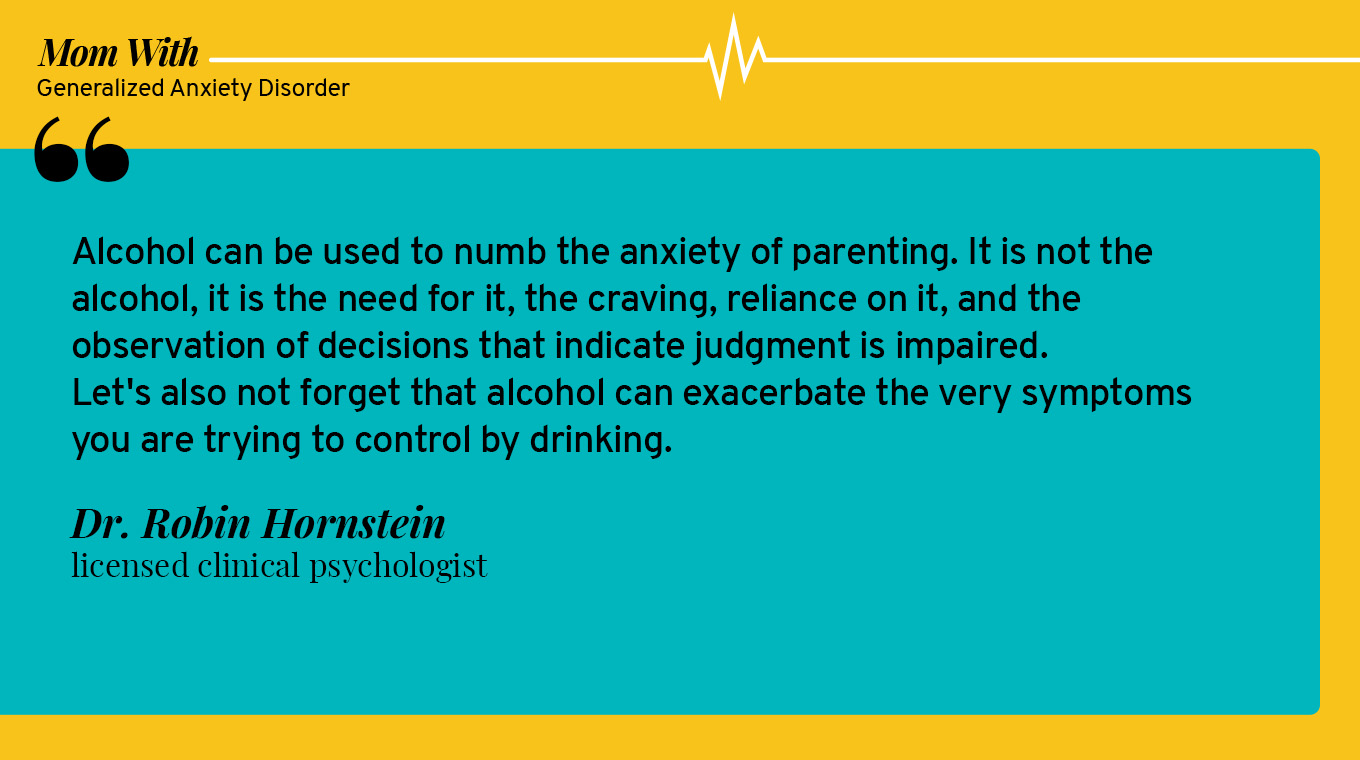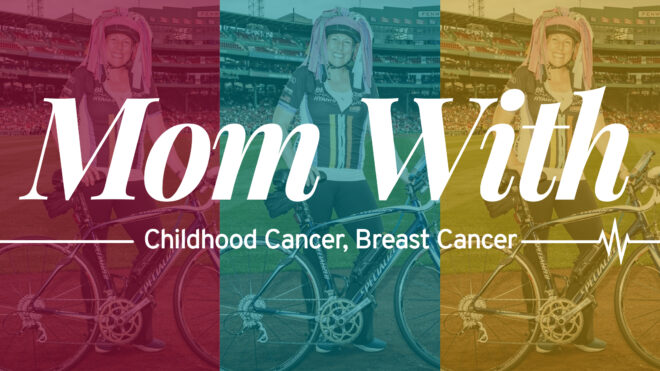
Our monthly column MOM WITH aims to redefine what it means to be a "normal" mother by focusing on how it feels to live with a mental disorder. We see you, we hear you, and we're in this together.
Samantha Perkins, an author and mom of two children under 10, has generalized anxiety disorder. She has had it her whole life and first took note of her struggles in high school. She would suffer from panic attacks at night that would take her breath away. Back then, there was little talk of mental health, so her condition went undiagnosed up until college. It was there that she learned she could manage her symptoms by using alcohol to numb her nervousness and panicked feelings. Now a mother, she talks about her journey toward sobriety on her blog and with us here at CafeMom.
"It seemed that many mothers coped with the stressors of parenting by drinking," says Samantha.

She often saw T-shirts for sale at Target that said “Mommy Needs Wine” or “They Whine I Wine.” But she noticed that alcohol was no longer taking the edge off and was making things worse.
“Motherhood is often anxiety provoking for moms as they adjust to having their lives managed by the needs and demands of little people,” says psychologist Dr. Robin Hornstein. “For someone with GAD, the anxieties can be magnified.” Common symptoms of GAD include irritability, worry, insomnia, concentration issues, and fatigue. These symptoms can make navigating motherhood even more precarious for moms.
Now sober, Samantha uses journaling, meditation, therapy, and medication to manage her anxiety.
"I prioritize taking care of myself first (exercise and sleep are crucial) which makes it easier to parent and be present for my family," she says. "A holistic approach has helped more than one specific intervention at a time."
The rate of alcohol consumption rose during the pandemic, for moms and for people in general. Hornstein noticed the memes and social media accounts touting "mommy wine culture" had sprung up with a counterbalance of sober moms’ groups.
“Alcohol can be used to numb the anxiety of parenting,” says Hornstein. “Moms can ask themselves if they are drinking more in front of kids than they did before or driving under the influence with kids in the car or even, 'Why am I drinking?' The answers can help guide the self-awareness of casual versus dependence drinking.”
From casual drinking to substance abuse is not measurable by numbers.
Mothers who suffer from anxiety can often feel overwhelmed by the chaos that everyday motherhood brings. Samantha finds that she is very sensitive to chaos and has come to recognize that she does her best when she can plan and predict what her day will look like.
As any mother can relate, trying to plan with young children can seem nearly impossible. But just having an idea of the day ahead can make things seem less overwhelming.
For Samantha, a good day starts with waking before her kids after a great night’s sleep.
“I go for a morning run and eat a healthy breakfast,” says Samantha. The power of a healthy, protein-rich breakfast can do wonders for most mothers and help them get their day started on the right foot. “I have to limit my coffee intake so that I don’t get that extra boost of adrenaline from the caffeine. I then feel ready and calm for whatever comes my way with the kids. We do what is planned and I’m able to work with minimal interruptions. I can write with ease and feel good about my work. At night I make dinner and we read before bed. Days are better when we have limited responsibilities, extra activities, and we can move at the pace that best suits our needs.”
For Samantha, bad days can come out of nowhere, and usually happen when she doesn’t get a good night’s sleep. She can feel anxious for no reason and gets exhausted from overthinking. Samantha says that on these days she will snap at her family and cancel work or any social obligations because she has trouble functioning with spiraling thoughts.
“These thoughts range from unworthiness to shame and are oftentimes irrational,” says Samantha. “Sometimes there are no negative thoughts at all, but my body is eaten up with intense stress that I can’t describe. I can’t focus and I lack motivation."
Samantha makes it a point to talk openly about anxiety in her home.
Since she recognizes that she has such an anxious presence at times, she wants her kids to know that this is about her and not them. They also know that alcohol made her anxiety worse and that she no longer drinks.
Personally, Samantha also feels that she fell victim to the “mommy wine” culture. She believed that drinking would solve her parenting woes. She tried to numb away the anxiety and hardships by drinking night after night. She would often wake up with regret, a slight hangover, and more parenting stress overall, which can lead to depression and anxiety or can make things way worse for someone who has a history of mental health struggles.
Samantha says that moms need help, support, child care, fewer obligations, fewer duties, adequate time off, health care, family-friendly accessible affordable mental health care, and so much more. Wine is not the answer, as she shares in her book Alive AF: One Anxious Mom’s Journey To Becoming Alcohol Free.
For any moms out there who believe they may have a drinking problem, please know that help is available.

Hornstein says there are great programs and therapists equipped to help a mom gain real control over her life and accept that she is doing her best even though she has a problem that needs attention. With loving care, people do find a way to get help. There is a group called the Sober Mom Squad, which was started in in 2020 and supports moms in recovery.
For too long, we have put a lid on speaking about mental health struggles. But with the past few years, between the pandemic, the war, social justice issues, and school shootings, speaking about our mental health is more relevant than ever. Keeping the conversation open about mental health is essential to making children realize that there is no shame in having these issues or talking about them.
Samantha believes that older generations struggled to let children in on their lives, which sometimes led to secrecy. “I recently read a quote about allowing our children to experience our flaws,” she says. “I get that not everyone wants to talk openly about their mental health struggles, but so many moms have them to some degree. The more we share our stories, both successes and failures, the more normal we make it for parenting as well as for our children.”
*Disclaimer: The advice on CafeMom.com is not a substitute for consultation with a medical professional or treatment for a specific condition. You should not use this information to diagnose or treat a health problem without consulting a qualified professional. Please contact your health-care provider with questions and concerns.







